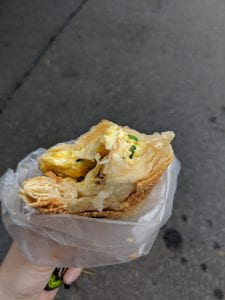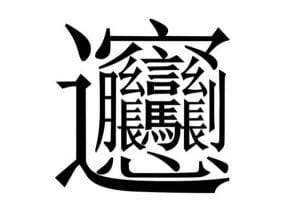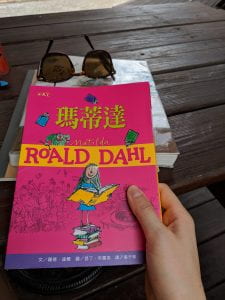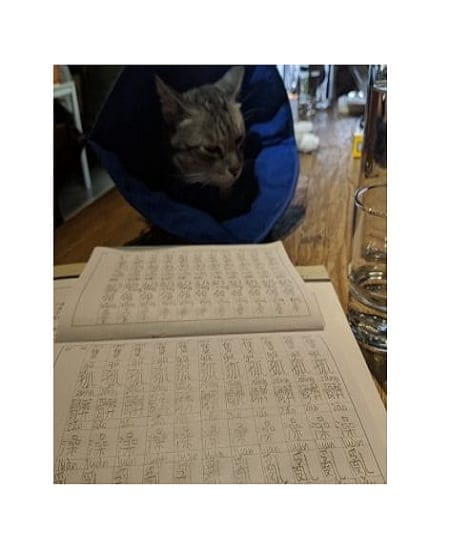Hello! Let me let you in on a secret:
The secret to studying a language and speaking it is to utterly stomp your pride into the ground and make a fool of yourself on a daily basis. I’m proud to say that I have mostly managed to stomp my pride into the ground and then have thrown the remnants of that pride in the trash. Why, just today, I was pretending to be, first, a McDonald’s (麥當勞) fast food worker promoting the newest promotion (又快又好吃!), and then, second, a waitress attempting to convince a customer to fill out a form for a member card.
Fortunately, the entire reason I came to Taiwan was to learn Chinese. And if I must embarrass myself while improving, so be it.

Every day, my teacher, 吳老師 (Ms. Wu) attempts to coerce my classmates and I into making sentences using the grammar patterns and vocabulary from the textbook. Before each class, she asks us to prepare something. Sometimes we have to go and ask strangers on the street (!) about the lesson topic. I think all students, regardless of their ability dread having to 做報告 (report) and speak to strangers but since most Taiwanese people are extremely friendly, it doesn’t matter if one embarrasses oneself as I did the one time I had to report on Taiwanese people’s favourite places in Taiwan.
After class, I like to go to the cafe right next to MTC’s building or a vegetarian 自助餐廳 (self-serve canteen). Sometimes, I also head to a cafe (cafe with a cat is preferred) to study, eat, or read. Here, it is fairly difficult to stumble over my words, but in the morning, at my favourite breakfast spot 曾家豆漿 (Zeng’s Soy Milk), I had no clue what anything was until I eavesdropped on other customers and discovered the name for a delicious and messy breakfast: 燒餅,加蔥蛋 (flaky sesame bread stuffed with a fried egg and green onions). Before that I just mumbled and pointed at my desired object.
When studying Chinese one must also be willing to write characters repeatedly (see main picture). Each Chinese word has four components; the tone, the character, the Pinyin, and the meaning. When speaking, you must be very careful, as each sound in Chinese can have multiple meanings. For example, the word wen can mean “to ask” or it could also mean “to kiss”. It’s more likely that I have accidentally said 請吻 (“May I kiss?”) more frequently than 請問 (“May I ask you a question?”).
Since I originally learned 簡體字 (simplified characters), I was initially at a disadvantage. Thankfully, living in Hong Kong helped me to learn to read the majority of 繁體字 (traditional characters). I just couldn’t write the characters. In addition to teachers paying attention to those four aspects of Chinese characters, teachers are often able to discern the order in which a student writes a character, forcing students to write exactly in that order. Luckily, we do not have to learn this character:

Aside from the obvious option of venturing outside and speaking to locals, MTC also encourages students to attend additional sessions. From Chinese in the Media (last class we discussed a famous Youtuber’s visit to the hidden snacks of 淡水), Chinese Cuisine and Dining ( last class, we discussed 東坡肉 -a layered cut of heavily marinated pork- and its history), to Taiwanese for Beginners, all of these classes attempt to encourage students to speak and participate more but most students are shy.
My favourite class is actually the class where we watch Time Story (光陰故的事). Though it doesn’t give me a chance to practice speaking Chinese, its actors all have different accents from Taiwan and the mainland. If one wishes to learn Taiwanese, one could also attempt it by watching this series. Sadly, I believe Taiwanese is beyond me even when I am reading the subtitles.

Finally, I have bought a book in Chinese to improve my reading Chinese skills. Unlike English, Chinese can be divided into written and spoken Chinese. This means that when you are reading, you’ll most likely see characters you’ve never learned or never speak in daily conversation. My choice of reading is 瑪蒂達. I haven’t read the book in approximately 20 years, but it is just as hilarious as I remembered. And it is really helping me to learn some very interesting words. It does feel slightly odd to be reading what is an elementary school level book in public, but when your Chinese reading level is at an elementary school level, that’s the only choice you have.
Until my next post, I’ll continue to embarrass and simultaneously learn Chinese while entertaining the citizens of Taipei to no end.

Lexi Wong M.A. International Affairs 2019
Sigur Center 2018 Asian Language Fellow
National Taiwan Normal University, Taipei
Lexi Wong is a Sigur Center 2018 Asian Language Fellow studying Mandarin in Taipei, Taiwan at National Taiwan Normal University’s Mandarin Training Center. Lexi is currently a first-year graduate student at The George Washington University’s Elliott School of International Affairs where she is studying International Affairs with a regional concentration on Asia.


